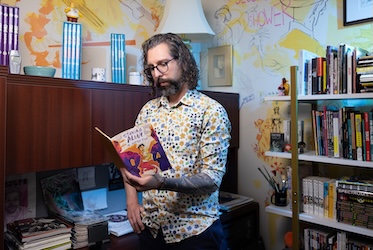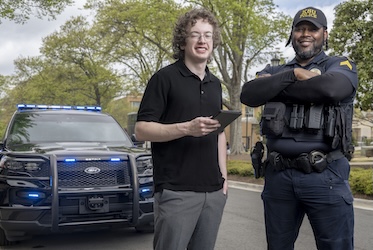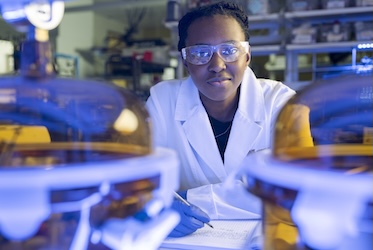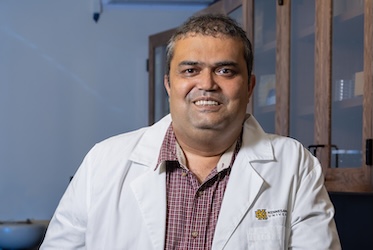
Kennesaw State and Georgia Aquarium find avenues to work together
KENNESAW, Ga. | Jan 31, 2022
Visitors love Georgia Aquarium for the wide variety of aquatic life they can view
up close. For some Kennesaw State University faculty and students, the downtown Atlanta
attraction has provided an outlet for their expertise and talents.
Songs of the sea
Guests entering Georgia Aquarium from its parking deck are being prepared for the
experience that awaits them inside with soaring aquatic-themed music recorded by the
Kennesaw State Wind Symphony.
The group was asked almost a year ago by Christopher Anderson, Georgia Aquarium manager
of audio visual to record music to be played at the facility.
“During the COVID-19 pandemic, everyone had to come up with different ways to create,” said Anderson. “Partnering with Debra Traficante and the Kennesaw State Wind Symphony proved to be the perfect fit when both parties were looking for ways to remain creative and reach out to people.”
“He heard a performance of ours online and reached out to ask if we would be interested in recording some music to be used at the aquarium,” said Debra Traficante, associate director of bands at KSU.
The coronavirus pandemic had sharply curtailed opportunities for Kennesaw State’s music students to perform and the opportunity to rehearse and make the recording for Georgia Aquarium was like a lifeline for the artists.
“Musicians want to perform, so we needed this,” Traficante said. “This opportunity came along at the perfect time.”
In the spring, the KSU Wind Symphony rehearsed and recorded the music Anderson requested and in midsummer it began playing for visitors at Georgia Aquarium.
“I’ve heard from students who have been to the aquarium since they started using the music, taking their families along with them to hear it,” Traficante said.
Learning through play
Children are a prime target audience for Georgia Aquarium. Families with children,
along with school and youth group field trips keep the attraction bustling with excitement.
The aquarium both entertains and teaches with the exhibits in its galleries.
When aquarium officials were looking to offer educational video games at the facility,
a KSU alumnus reached out to Michael Franklin, assistant professor of computer game
design and development.
Franklin was able to refer some of his students who had formed a game design studio
for the job and they worked with the vendor that supplied the aquarium with the games.
“We had a group of super sharp students who wanted to jump on the opportunity. They did a great job and knocked it out of the park,” Franklin said.
The games the students created teach children about the importance of keeping oceans
clean for the animals who live there.
In one game, Franklin said, players are on an ocean-going trawler and use a mechanical arm to put trash fished from the water into one of three bins: one for recycling, another for compostable items and finally one for items that must go to a landfill.
“The other game is a little more of an arcade-style, with players steering the boat left and right and you scoop up things out of the ocean,” Franklin said. “The purpose is to teach kids to differentiate trash from recyclable and compostable materials and teach them responsibility.”
The KSU students who developed the games, now KSU alumni, are in the process of updating them to shift the focus to a river environment, Franklin said.
Coastal checkup
One collaboration between Kennesaw State and Georgia Aquarium took place along the Georgia Coast, about 300 miles away from either institution. KSU graduate student Allyson Stiles, with assistance from aquarium research scientist Dr. Kady Lyons, is studying the effects of human activity on the health of Georgia’s coastal estuaries.
“In my project, I am comparing a variety of metrics from the three estuaries,” Stiles said. “This includes sediment contaminants, bacterial counts in the water, and a few indicators of health in juvenile sharks such as their body condition and mercury in their tissues.”
Stiles and Lyons spent weeks visiting six sites in each sound collecting data for
the study along with colleagues from University of Georgia and Georgia Southern University.
Stiles said the field work held some surprises for her.
“It was surprising how many sharks reside within our Georgia estuaries. We caught 200 sharks composed of six species this season,” Stiles said. “Once we had a shark on board, it was weighed, measured, tagged (if large enough), fin clipped, and a small blood sample was taken.” Following the sharks’ work ups, they were safely released back into the sound.
After wrapping up field work in August, Stiles has been analyzing the collected data
with Lyons and her Kennesaw State graduate advisers Dr. Thomas McElroy, associate
professor of biology, and Dr. Troy Mutchler, assistant professor of biology.
“The support that I have received from Georgia Aquarium and Dr. Lyons is invaluable. I have been working with Dr. Lyons for three years, and she has been an amazing mentor. She has given me the hands-on experience that I needed to learn what marine biology research entails. This project could not have happened without her constant guidance and willingness to help me learn,” Stiles said.
“When Allyson came to me about ideas for her master’s degree, I said that ‘it can’t just be about sharks’ and challenged her to think more broadly,” said Lyons. “Allyson has done a wonderful job designing this holistic study where we can take a wider view of estuarine health and human impacts on these important ecosystems.”
– Gary Tanner
Photos by David Caselli
Related Stories

Kennesaw State professor uses experience to inspire art students

Kennesaw State student develops AI tools to help first responders diagnose behavioral health issues

Chemistry student engaged in sustainable catalyst research through Kennesaw State's First-Year Scholars program

Kennesaw State researchers awarded Department of Energy grant to investigate materials that boost energy-efficient technologies
A leader in innovative teaching and learning, Kennesaw State University offers undergraduate, graduate, and doctoral degrees to its more than 47,000 students. Kennesaw State is a member of the University System of Georgia with 11 academic colleges. The university’s vibrant campus culture, diverse population, strong global ties, and entrepreneurial spirit draw students from throughout the country and the world. Kennesaw State is a Carnegie-designated doctoral research institution (R2), placing it among an elite group of only 8 percent of U.S. colleges and universities with an R1 or R2 status. For more information, visit kennesaw.edu.















